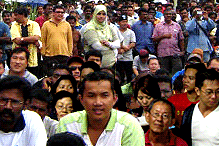It looks increasingly as if Malaysia will return to an era of near-dictatorship and flagrant abuse of power under Najib. That Najib would accept two legislators who have corruption charges pending against them to regain power instead of instituting reforms to clean up the ruling coalition is worrying. Najib has sacrificed real reforms and long term gains for BN in favour of short term gains for his ambitions.
Malaysians are disgusted with how BN grabbed power in Perak. The way in which Najib orchestrated these defections (with legislators going missing) is also a worry. The fact that the private investigator who made a statutory declaration that Najib is involved in the murder of a Mongolian national is still missing only compounds this worry.
There are also constitutional concerns. When the Speaker of the House declared the two seats vacant, the Election Commissioner, went beyond his constitutional authority and ruled that the seats were not vacant. The Election Commissioner, in doing so, took upon the powers of the Speaker and the Judiciary in determining the validity of the resignations.
Anwar and PR must take full stock of these developments. There is no way that PR can outmanoeuvre BN through unethical means. PR needs to strengthen its capacity to govern, and take that message directly to the people.
As PR is a new alliance, more resources will need to be spent on strengthening it. There were clear indications that all was not well within the Perak DAP – the main reason for the DAP member’s defection. The PR government failed to stand down the two legislators who were accused of corruption, allowing BN to use the state apparatus against them. And importantly, Anwar lost the moral high ground when he accepted the defection of the UMNO member into PR.
It is becoming clear that PKR is a party without an ideology. Since its formation in 1998, it has been mostly filled with unhappy ex-UMNO politicians. There are several high ranking PKR members who have since returned to UMNO. Without any clear ideology, PKR has an uncanny ability to attract dubious characters looking for quick pay-offs from the political process, rather than with broader political ambitions. The other members of PR – the Islamic Party of Malaysia (PAS), the Democratic Action Party of Malaysia (DAP) and the Socialist Party of Malaysia (PSM) – are used to being in the opposition, and attract individuals who are more committed to public service.
The lesson for Anwar from the Perak debacle is the need to return to higher principles. PR must challenge the validity of the BN government in Perak but it must also focus on strengthening the alliance in governing the four PR-led states.
The current global crisis presents a unique opportunity for Anwar to showcase his leadership qualities by providing sound policy proposals to lead Malaysia out of the morass it is in. Domestically, Anwar and PR should fight hard to develop a stimulus plan that allows Malaysia to weather the current global economic crisis, as well as to prepare the Malaysian economy for the future. In the region, ASEAN badly needs a charismatic figure to lead them out of the paralysis that key ASEAN members (Thailand, Malaysia, Indonesia and Philippines) are facing. Anwar has all the pre-requisites to be a leader. But Malaysians want him to become a leader democratically and with high principles.
Gregore Lopez is currently pursuing a PhD in Economics at Australian National University and blogs at greglopez.wordpress.com. He also volunteers as the Editor of the Malaysia section of New Mandala.


“Anwar has all the pre-requisites to be a leader. But Malaysians want him to become a leader democratically and with high principles.”
How true it is.
We owe it to ourselves, to be honest with ourselves. Mahathir made the same mistake. Karpal is probably the only person in Malaysia who has some sense, principles, foresight and a spine. In Anwar, we saw the charisma, the fighting spirit, the feeling that we belong in a “struggle”. All to realise later that it was all nothing more than a politician’s game.
Anwar Ibrahim has always been and will always be Anwar Ibrahim. Can’t teach old dog new tricks. Nothing has and will ever change him. By now most of us has realised and honest to admit – he has proven that he is, after all, still himself.
Oh well, it was a fun show while it lasted.